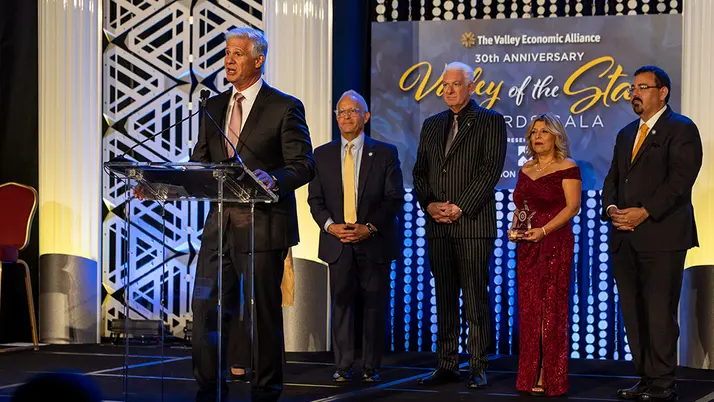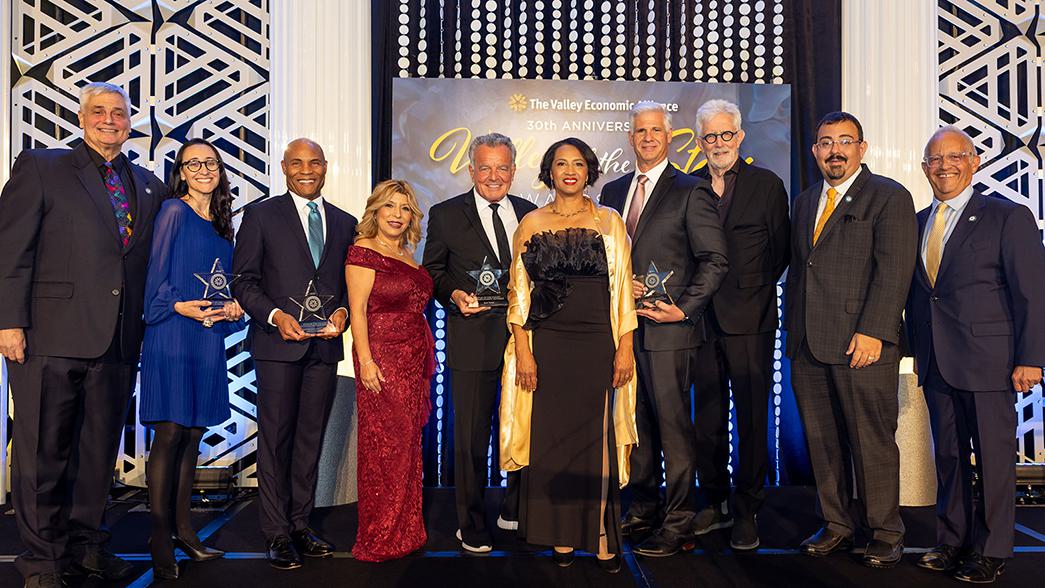LAJH CEO and President Dale Surowitz Receives Humanitarian Award From the Valley Economic Alliance


Los Angeles Jewish Health CEO and President Dale Surowitz Receives Humanitarian Award From the Valley Economic Alliance
Last month, Los Angeles Jewish Health (LAJH) CEO and President Dale Surowitz received the Valley Economic Alliance’s prestigious Humanitarian Award. To anyone who knows Dale, the recognition came as no surprise. He took the helm at LAJH just five years ago, but his involvement with the organization—a nonprofit that has been beloved in the Jewish community for more than a century—began decades earlier. In his youth, he visited relatives living at LAJH, then, as he advanced his career as head of prestigious healthcare organizations (including Providence Cedars-Sinai Tarzana), he contributed to LAJH as a leadership volunteer.
“Dale works tirelessly to advance the greater good of the community,” says Larissa Stepanians, LAJH’s chief operating officer. “He looks at every opportunity for us to improve the lives of the seniors we serve.”
That relentless focus on strengthening senior services has been characteristic of Dale’s tenure at LAJH. Since his arrival, he has continued to blaze a trail to excellence, inspiring everyone from the leadership team to individual staff members to find new ways to help seniors thrive.
“I believe we have an ethical and social responsibility to take care of those who don’t have the ability to care for themselves,” Dale says. “At LAJH, we work together to uplift our community’s seniors and treat them with the respect and dignity they deserve.”

Dale’s leadership and vision have been instrumental in advancing LAJH’s vital mission. Under his stewardship, LAJH was a national leader in keeping residents safe during COVID, showing it was possible to provide seniors with a secure and nurturing environment even in the midst of a global pandemic.
“At LAJH, we have our own on-site practitioners, nurses, therapists, and pharmacists. As a result of our coordinated care and service, we are well-positioned to ensure our seniors stay as healthy as possible, despite whatever challenge comes our way,” Dale says. “I’m incredibly proud of our entire team—under the direction of Chief Medical Officer Dr. Noah Marco and Chief Nursing Officer Tim Carlson—each of whom contributes to our community in their own amazing ways.”
Another of Dale’s key strengths is building collaborative relationships with prominent community partners to create an even larger, dynamic network of care capable of meeting the full range of needs for a rapidly growing population of vulnerable seniors.
Those partnerships include teaming up with Altamed, the largest provider of healthcare services to the Latino community in East Los Angeles and into Orange County, to establish a satellite campus of LAJH’s renowned Annenberg School of Nursing. The goal is to train more highly skilled nursing professionals and expand LAJH’s ability to have a positive health impact on L.A.’s senior community.
“We have a truly outstanding nursing program, ranked among the state’s best for licensed vocational nursing (LVN) programs, and we’re excited to offer our expertise to benefit even greater numbers of seniors,” Dale says.
Among Dale’s other ongoing initiatives is growing the footprint of LAJH’s Brandman Centers for Senior Care (BCSC) PACE program, which provides seniors the crucial resources and support they need to remain living safely in their homes while receiving health and social services at vibrant activity centers.
“We’ve submitted applications to build new BCSC PACE facilities in Van Nuys, the South Bay, and Palm Springs. This program reaches out into the community and helps coordinate care for seniors by providing them with primary care services, specialty healthcare services, adult day healthcare, transportation, and meals—and it’s all included,” Dale says. “BCSC PACE reduces hospitalizations and enhances quality of life, and in my view is one of the best things going in healthcare today.”
Funding these ambitious plans requires ongoing investments from dedicated philanthropists. To meet this need, LAJH will be embarking on a new capital campaign to share LAJH’s story, and the critical need for resources, among key individuals and groups.
“We’re going to be engaging donors in efforts to revitalize our campuses, including adding more independent and assisted living,” he says. “The number of seniors in L.A. is predicted to double between 2020 and 2040; people are living longer and outstripping their financial resources. We urgently need more housing and more coordinate care and services, but who will step up to make that happen? At LAJH, we believe it’s our obligation to do so.”

Dale’s commitment to giving back is clear evidence of why members of the Los Angeles philanthropy and business communities have honored him for decades. In addition to the Humanitarian Award, he has also been recognized with the Fernando Award (the highest award for volunteerism and philanthropy in the San Fernando Valley), the Community Leadership Award from MAPS Charities and the Heart of Gold Award from the Child Development Institute. He is also a member of Los Angeles Mayor Karen Bass’ Valley Advisory Board.
Yet, even when he is earning accolades, Dale deftly switches the subject away from himself and back to his enduring passion: guaranteeing LAJH’s long-term success and sustainability as a provider of essential senior care.
“There’s so much for us to do if we are going to meet the rising tide of need, and I believe LAJH is up to the challenge,” he says. “This is a truly special place, where we treat residents as if they are members of our own family and where we remain focused on what matters most: making a positive difference for today’s seniors and for seniors in the future.”